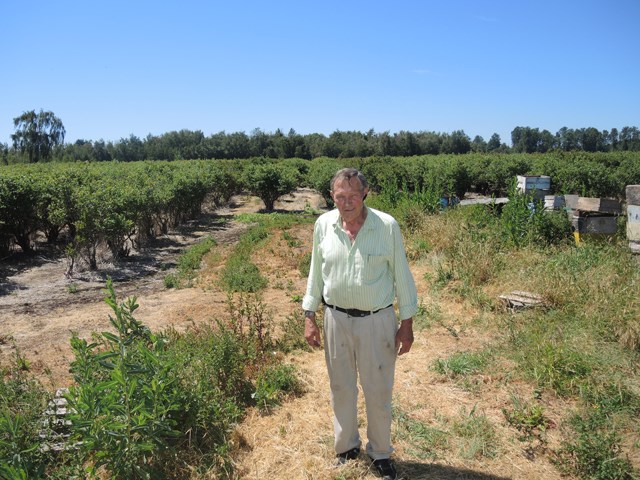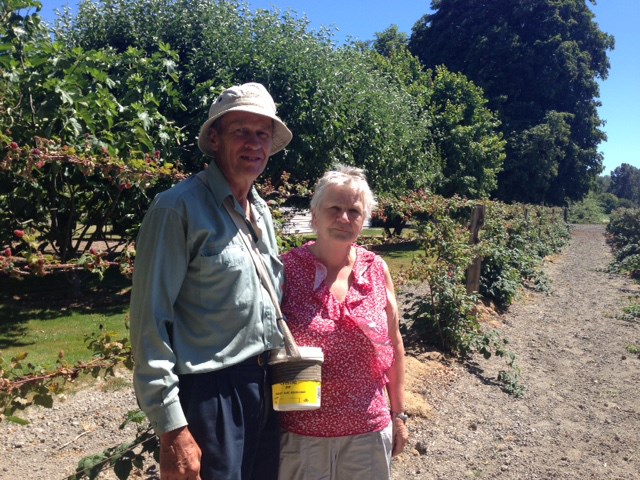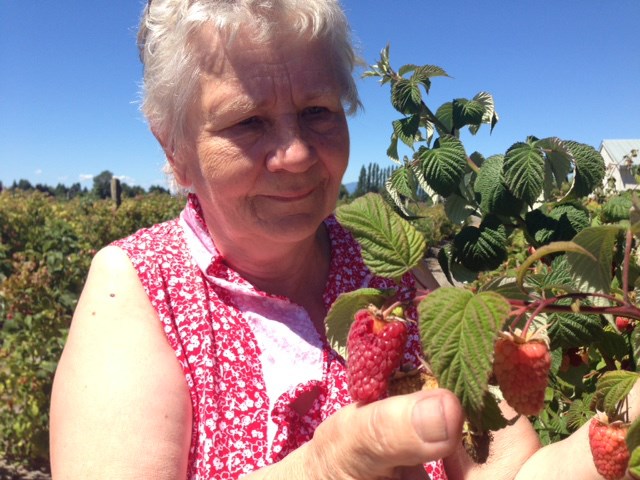TWO weeks early, three weeks early, the earliest in 25 and 35 years and a Juneberry that’s never blossomed in June in 50 years.
As the News journeyed Lulu Island from north to south, crunching over the scorched earth that is usually Richmond’s rich and ripe berry land, the commentary from the farmers had a familiar groan to it.
Despite assumptions to the contrary, the current, seemingly unrelenting heatwave — on the tail of one of the mildest winters and warmest springs on record — is wreaking havoc with the city’s blueberry and raspberry crops.
Tiny, yet super sweet, berries, ripening almost overnight, was the common complaint from seasoned professionals, with a collective career nearing a century, on vast, blueberry acreages at Cambie and No. 6 roads, down to a mom and pop raspberry operation south of Shell Road and Steveston Highway.
“There is no green on there at all. They are all ripening at the same time and it’s going to be a rush to get them out there (to market),” said Gurpal Birak, owner of Birak Berry Farms, headquartered at 4200 No. 6 Rd., as he inspected some blueberry bushes in the baking, early afternoon sun.
“They are very small, but very sweet.”
Birak, who operates 30 acres of strawberries, 10 acres of blackberries and 350 acres of blueberries, started harvesting June 19 — the earliest he’s had to do that in 35 years and a full two weeks ahead of schedule.
“The race is on (to harvest and get it to market).”
A similar tone was echoed further south on Richmond’s blueberry map near No. 6 and Blundell roads, where Bob Fisher has been farming 10 acres for 30 years, with his father another 20 years before.
“They’re so small and already wanting to turn blue. The U-pickers will not even pick them,” said Fisher, while inspecting his “bluecrop No. 1” variety and taking a short break from his regular, 16-hour, harvest time day.
“The biggest problem has been the fruit ripening way too quickly and not getting the opportunity to size up. This happened last year as well, but not quite to this extent.
“A lot of the crop is not worth even picking; maybe even as much as 30 to 40 per cent. Last year, that was only about five to 10 per cent.”
Harvesting at Fishers Blueberry Farm started June 22 — it’s normally some time in July — and with it produced a surprise dating back half a century.

“My father planted a Juneberry variety way back in the beginning and in all these years, it’s never actually been ready to harvest in June — until this year,” smiled Fisher, picking his way through the peat-soiled rows of bluecrop blueberries, closely followed by Cocoa, his faithful black Labrador.
“At this rate, I reckon we will be done about Aug. 15. We’re usually still going a month after that.”
BETTY and Ben Baerg have been running Shell Road Farm, a five-acre raspberry and Tayberry farm, complete with backyard sales kiosk, on Shell Road just south of Steveston Highway for 25 years.

Next month, when the last Cascade, Chemainus or Ukee raspberry is picked on the clay acreage behind the family home, the “season over” sign will go up one last time, as the 71-year-old Baergs have sold up to retire to Sardis, near Chilliwack.
“The Tayberries are already past their peak and they don’t usually start until the last week of June,” said Ben Baerg, a retired aircraft mechanic.
“The heat has really affected the size. A few have heat scald, it affects the pigmentation. And the roots sometimes don’t have the strength to produce the fruit when it’s this hot.”
Betty, who gave up her nursing career 25 years ago to run the farm, said the intense heat in May and June will ultimately cut their season’s crop in half.
“We’ll certainly have a lot less this year, about half the normal 7,000 pounds,” she added.
“Last year, it was hot as well, but there was lots of rain near the end of June, which helped.”
The Baergs only sell the berries that were picked the same day. What’s not sold goes straight into the deep freeze. One customer has already bought everything that’s in the freezer.
“We have no irrigation out there, so we rely on nature,” said Betty about the lack of rain.
“It’s about $100 a day to hook up to the water, so that doesn’t make any sense for a small operation such as this.”
Asked to think back if it’s been this hot, this long before, Betty couldn’t recall an early heatwave as sustained as the current blast.
And queried about how the couple felt about giving up their farm to new owners, whose intentions are unclear to the Baergs, a hint of a tear formed in one of her eyes.
“I guess it’s bitter-sweet,” she said, assuming no pun was intended.
“We have met so many good people and have many very good customers.”
To that end, the Baergs, despite their last ever crop being drastically smaller than average, have not adjusted their price — $4 for a pound, $54 for a flat.
“It’s our last year and we wanted to be loyal to our customers,” she said.
Birak’s blueberry prices will also remain true at $2 per pound.
“It’s always the same price; the same price as last year,” said Birak. “That way, my customers know what to expect.”
Fisher, meanwhile, believes the rapid ripening of the blueberry is driving the price down a little this season.
“Everyone is rushing to the market at the same time,” he added, noting that his main outlets are in the B.C. Interior, Calgary and the cruise ships that dock in Vancouver.”



